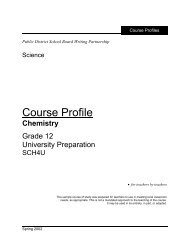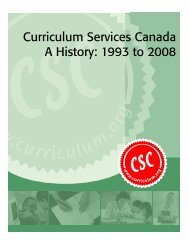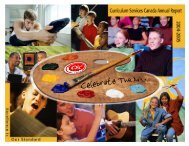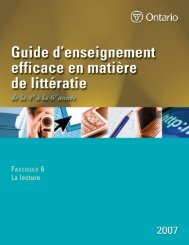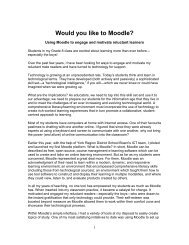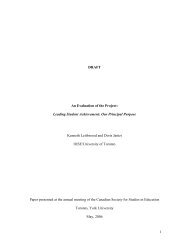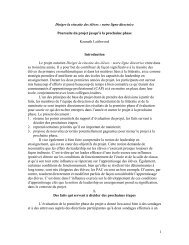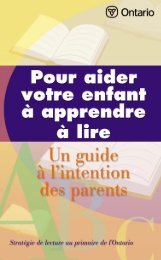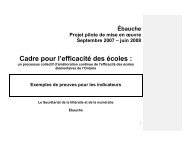Aboriginal Beliefs, Values, and Aspirations in Contemporary Society
Aboriginal Beliefs, Values, and Aspirations in Contemporary Society
Aboriginal Beliefs, Values, and Aspirations in Contemporary Society
Create successful ePaper yourself
Turn your PDF publications into a flip-book with our unique Google optimized e-Paper software.
Unit 1 Overview Chart<br />
Activity Expectations Assessment Focus/Tasks/Activities<br />
1<br />
180<br />
m<strong>in</strong>utes<br />
IDV.01,<br />
IDV.02,<br />
IDV.03,<br />
IDV.04,<br />
CH1.04,<br />
CH2.03<br />
- mapp<strong>in</strong>g (K/U, T/I)<br />
- group <strong>in</strong>vestigation<br />
(T/I, C, A)<br />
<strong>Aborig<strong>in</strong>al</strong> Identity<br />
Students:<br />
- trace their family roots by construct<strong>in</strong>g a<br />
family tree;<br />
- map regions of Canada <strong>and</strong> Ontario to show<br />
where First Nation communities, Inuit<br />
communities, <strong>and</strong> Métis are located;<br />
- <strong>in</strong>vestigate ways an <strong>in</strong>dividual can establish an<br />
identity with<strong>in</strong> the context of family,<br />
community, school, prov<strong>in</strong>ce, <strong>and</strong> nation.<br />
2<br />
180<br />
m<strong>in</strong>utes<br />
3<br />
240<br />
m<strong>in</strong>utes<br />
RE1.02,<br />
RE3.02,<br />
SOV.01,<br />
SOV.02<br />
CHV.03,<br />
CH1.01,<br />
CH3.01,<br />
IDV.03,<br />
SO2.01<br />
K/U = Knowledge/Underst<strong>and</strong><strong>in</strong>g<br />
T/I = Th<strong>in</strong>k<strong>in</strong>g/Inquiry<br />
- construct an<br />
organizer (K/U, T/I)<br />
- write description of<br />
roles (K/U, C, A)<br />
- group <strong>in</strong>vestigations<br />
of different contact<br />
periods with different<br />
<strong>Aborig<strong>in</strong>al</strong> cultures<br />
(K/U, T/I)<br />
- oral reports (C, A)<br />
Cultural Identity<br />
Students exam<strong>in</strong>e traditional roles that hunt<strong>in</strong>g,<br />
gather<strong>in</strong>g cultures dem<strong>and</strong>ed.<br />
Challenges to Cultural Identity<br />
Students <strong>in</strong>vestigate how roles were challenged<br />
by non-<strong>Aborig<strong>in</strong>al</strong> society <strong>in</strong> different regions<br />
<strong>and</strong> different time frames (e.g., 1600s, 1700s,<br />
1800s, 1970s).<br />
C = Communication<br />
A = Application<br />
Unit 2: <strong>Aborig<strong>in</strong>al</strong> <strong>Beliefs</strong> <strong>and</strong> Value Systems: The Impact of Colonialism<br />
Time: 25 hours<br />
Unit Description<br />
In order to exam<strong>in</strong>e the question “Who Am I?” students explore the mean<strong>in</strong>gs <strong>and</strong> significance of<br />
creation stories <strong>in</strong> both <strong>Aborig<strong>in</strong>al</strong> <strong>and</strong> non-<strong>Aborig<strong>in</strong>al</strong> contexts. Students exam<strong>in</strong>e how beliefs <strong>and</strong> value<br />
systems are formed <strong>and</strong> re<strong>in</strong>forced through traditional learn<strong>in</strong>g <strong>and</strong> spiritual practices passed from<br />
generation to generation through stories, ceremonies, <strong>and</strong> celebrations.<br />
The impact of European <strong>and</strong> non-<strong>Aborig<strong>in</strong>al</strong> contacts, which have placed layers <strong>and</strong> layers of <strong>in</strong>fluence<br />
on traditional beliefs <strong>and</strong> practices, is another focus of the unit. The experiences of communities, clans,<br />
tribes, <strong>and</strong> nations are exam<strong>in</strong>ed <strong>in</strong> an historical context. Students <strong>in</strong>vestigate how explorers, fur traders,<br />
missionaries, churches, l<strong>and</strong> agents, government agencies, <strong>and</strong> government policies came <strong>in</strong>to conflict<br />
with <strong>Aborig<strong>in</strong>al</strong> communities who were forced to re-adjust to contrast<strong>in</strong>g notions of progress <strong>and</strong><br />
prosperity. The need for knowledge, self-awareness, support, <strong>and</strong> growth to restore balance for<br />
<strong>Aborig<strong>in</strong>al</strong> peoples is exam<strong>in</strong>ed through <strong>in</strong>vestigation of heal<strong>in</strong>g <strong>in</strong>itiatives <strong>and</strong> traditional practices.<br />
Roles of men, women, <strong>and</strong> children are exam<strong>in</strong>ed historically <strong>and</strong> <strong>in</strong> a contemporary context.<br />
Page 3<br />
• <strong>Aborig<strong>in</strong>al</strong> <strong>Beliefs</strong>, <strong>Values</strong>, <strong>and</strong> <strong>Aspirations</strong> <strong>in</strong> <strong>Contemporary</strong> <strong>Society</strong> - College Preparation



